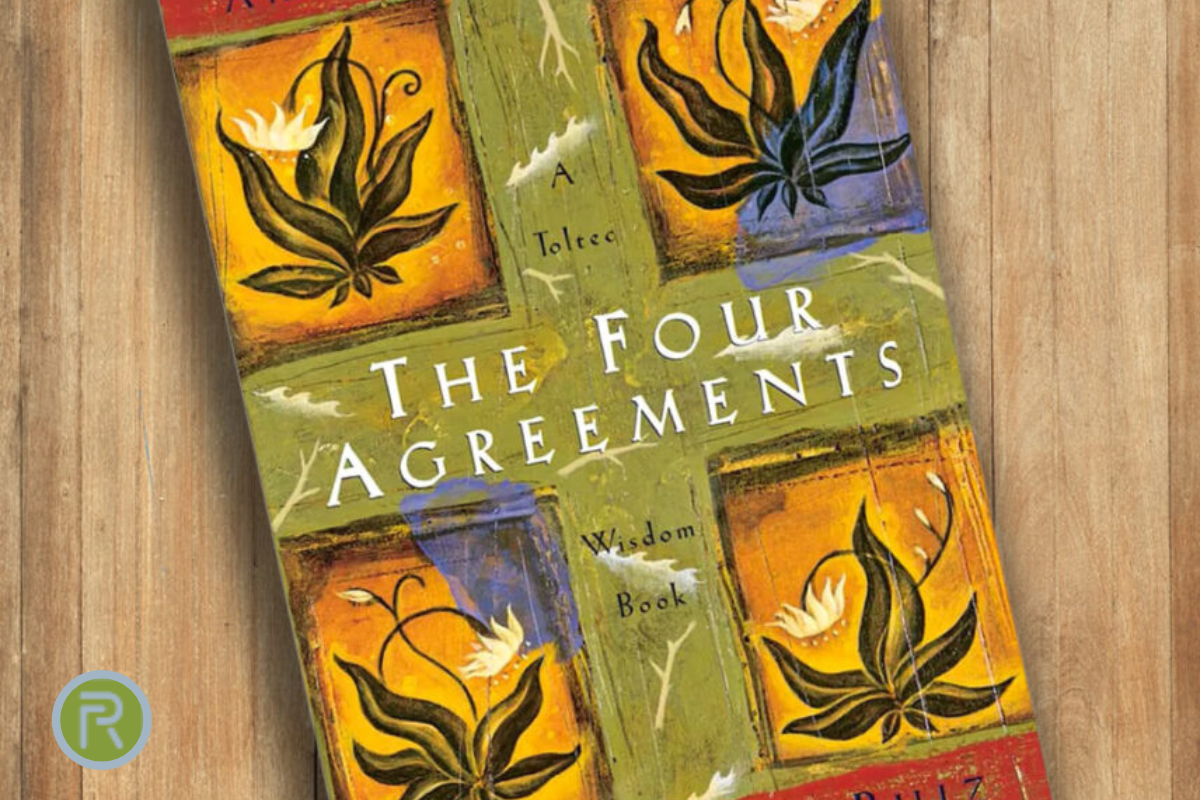Finding calm and clarity can seem unattainable in a society full of ongoing stress, self-doubt, and social expectations. The Four Agreements by Don Miguel Ruiz is a timeless guide to obtaining happiness, self-awareness, and personal independence. The book, which has its roots in ancient Toltec wisdom, outlines four straightforward yet deep ideas that, when applied consistently, have the power to change our lives.
What are The Four Agreements and What Do They Mean?
Don Miguel Ruiz lists four fundamental agreements in his book that act as a framework for leading a happy and genuine life.
1. Be Impeccable with Your Word
- Talk honorably.
- Just say what you mean.
- Steer clear of dishonesty, gossip, and negative self-talk.
- Encourage and boost others with your remarks.
Meaning: Words are incredibly powerful. The significance of stating the truth and use words to promote good rather than damage is emphasized by this agreement.
See Also: Educational Development Programs
2. Don’t Take Anything Personally
- Recognize that other people’s actions and words represent their reality.
- Don’t respond too strongly to compliments or criticism.
- Take care of your mental health.
Meaning: This agreement stresses emotional fortitude and not allowing other people’s perceptions of you to determine your value.
3. Don’t Make Assumptions
- Instead of making assumptions, ask questions.
- Be clear in your communication to prevent miscommunications.
- In your interactions, show curiosity and openness.
Meaning: Assumptions frequently lead to misunderstandings and disputes. This agreement encourages open and honest communication.
4. Always Do Your Best
- Your “best” will change based on the situation, your level of energy, and your attitude.
- Steer clear of remorse and self-criticism.
- Put your all into everything that you do.
Meaning: Making an effort to perform at your highest level reduces feelings of regret or failure and increases feelings of fulfillment.
Is The Four Agreements a Religious Book?
The Four Agreements are not associated with any one religion, even though they are based on the ancient Mexican philosophy known as Toltec wisdom. Rather, it functions as a spiritual manual that provides universal truths that are relevant to individuals of various religions or belief systems.
Spiritual, Not Religious
- The lessons emphasize inner serenity, attention, and self-awareness.
- It inspires readers to develop their own authenticity and challenge cultural programming.
- Without enforcing orthodoxy, the agreements can be modified to accommodate different worldviews.
See also: New Year Wishes : Heartfelt Messages to Welcome a Fresh Start
The Four Principles of Toltec Wisdom
The Four Agreements were established by the Toltec culture, which was renowned for its profound spiritual understanding.
- Awareness: Becoming conscious of societal conditioning and limiting beliefs.
- Transformation: Actively shifting thought patterns and behaviors.
- Intent: Setting clear, positive intentions behind actions.
- Love: Embracing love as the foundation for personal and collective healing.
Each agreement is intricately intertwined with these values, which provide a unified framework for inner serenity and self-improvement.
Criticisms and Praise of The Four Agreements
Criticisms:
- The lessons are too simple or repetitious for some readers.
- Critics claim that the book is devoid of detailed, actionable guidance.
- Skeptics wonder if such ideas can make a big difference in today’s complicated lives.
Praise:
- A wide range of people may understand it because of its simplicity and clarity.
- When consistently applied, the lessons frequently have a transforming effect on readers.
- It combines timeless knowledge with current applicability.
The Four Agreements has sold millions of copies worldwide and is still highly regarded in spite of its detractors.
How to Apply The Four Agreements in Daily Life
- Practice Mindful Communication: Choose words thoughtfully in both speech and writing.
- Embrace Emotional Resilience: Remember that people’s opinions often have more to do with them than you.
- Seek Clarity: Ask questions and confirm understanding in conversations.
- Give Your Best Effort: Approach tasks with focus and dedication, regardless of the outcome.
Real-Life Example:
Consider getting unfavorable comments at work. Clarify any misunderstandings (Don’t Make Assumptions) and react professionally (Be Impeccable with Your Word) rather than taking it personally (Don’t Take Anything Personally).
Conclusion
Don Miguel Ruiz’s Four Agreements is still a timeless manual for anybody looking for self-awareness, inner tranquility, and independence. Its wisdom cuts over social, religious, and cultural divides and provides useful guidance for overcoming obstacles in life.
The strength of these agreements is in regular practice and introspection, regardless of whether you’re learning about them for the first time or reviewing them.
See also: Importance of Educational Psychology in Enhancing Learning
FAQs
What are the 4 agreements and what do they mean?
The Four Agreements serve as a set of guidelines:
- Don’t take anything personally
- Don’t assume anything
- Be impeccable with your word.
- Always try your most.
Enhancing self-awareness, communication, and emotional resilience are the main goals of each.
Is The Four Agreements a religious book?
No, it is a spiritual manual that offers universal concepts that are relevant to other belief systems and is founded on Toltec wisdom.
What are the 4 principles of Toltec wisdom?
The agreements are based on the following principles: awareness, transformation, intent, and love.
What are the 4 stages of agreement?
The stages are:
- Awareness of limiting beliefs
- Acceptance of new agreements
- Integration into daily life
- Mastery through consistent practice
5. Why is The Four Agreements considered transformative?
The lessons in the book offer straightforward yet effective methods for enhancing communication, lessening emotional distress, and gaining personal autonomy.




